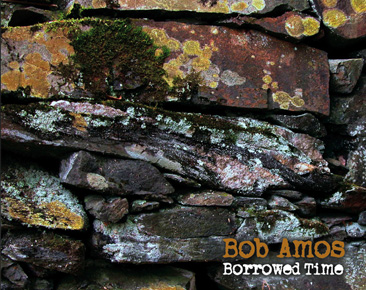He was born the fourth of five children and was influenced early on by his eldest brother, who brought bluegrass records into the household.
Amos started singing in choirs/choral groups, in church and/or school, when he was about six or seven years old. His deep-seated love of harmony singing comes from those times. He started playing guitar when he was about 12, and banjo shortly afterwards.
He played in local bluegrass bands mostly as a banjo player and part singer, in Delaware during high school, and in college in Ohio, then during his graduate school days in Arizona, where he earned a Master’s degree in geology. In 1982 he moved to Colorado to work as a geologist. Amos played around with various friends before forming Front Range with the help of mandolin player Mike Lantz.
They recorded a couple of self-released albums, made an appearance at the IBMA World of Bluegrass convention in 1991 and shortly afterwards signed with Sugar Hill Records. At about that time the band line-up consolidated with the addition of Ron Lynam (banjo) and Bob Dick (bass); Amos had switched to playing guitar when the band was first formed.
In 1991 his song One Beautiful Day won the IBMA Gospel Recording of the Year award.
Hot Rize is one of the few bands to record a Bob Amos song, adding Where the Wild River Rolls to their last album. Otherwise, One Beautiful Day has been recorded by some regionally known bands, as has High Mountain Meadow. Amos comments, “I haven’t ever purposely written for other people. I just write what I like to write, and sometimes other folks pick up the songs”.
Front Range disbanded in 2006 after Lantz died of brain cancer.
Since then Amos has relocated to Vermont where he has established a recording studio and is producing album projects for other artists, as well as working on his own projects. He continues to perform regionally with various ensembles also.
Those include Wherever I Go (released in 1999), Reels of Life (2004) and Wide Open Blue (2010). They all contained an eclectic mix of songs that Amos has written, regardless of style. It was a way for him to stretch out as a songwriter, and embrace all the styles of music that he loves.
From 2005 to 2010 he led The Bob Amos Band, which was ‘a singer-songwriter band,’ and included his son Nate and daughter Sarah.
Currently, he fronts a bluegrass band called Bob Amos & Catamount Crossing.
His latest album is the excellent all-bluegrass collection Borrowed Time (Bristecone 1007).
Where were you born and raised?
Delaware during the school year (my Dad taught school there), and Vermont in the summers. I have strong ties to both places.
In the notes to Borrowed Time you say that your mother nurtured your artistic bent. How did that manifest itself?
She always supported me, and she was also an inspirational figure for me. My father was a science teacher, and while he always appreciated my talent, he would often think in more traditional or practical terms, as in “music is fine for a hobby, but what are you really going to do?”
But my Mom from the start recognized my connection with and the depth of my passion for music. Her father had been quite musical, and they were very close. Over the years she encouraged me to listen to my heart and follow my dreams.
She wasn’t a musician herself, but she was a very good amateur poet, and she was a keen observer of life and people, which helps when you are a songwriter. She was always very interested in my song lyrics, and would often read my lyrics carefully and make thoughtful suggestions.
My wife Anne often does that too. I think having people who are close to you giving you honest feedback is key, and I think that’s why I’ve always worked on my lyrics so devotedly.
When and why did you become interested in music / bluegrass music?
Music was constantly being played on record players in our house when I was growing up. Although it was a large family, and we all sang in school and church choirs, I ended up being the only real musician in the end. But everyone in that big old house loved listening to music, and so there was always music on: all sorts of music; everything from show tunes and opera to folk music and African drum records. Not to mention all the great popular music of the 1960s.
As far as hearing bluegrass specifically, I probably first heard it on the Beverly Hillbillies TV show, when I was quite young. I do remember being entranced with the banjo. My father had some records with banjo on them, and I was fascinated with the sound. My oldest brother also had some bluegrass records, which I think I borrowed as a little kid.
It didn’t take me long to get hooked. In my early teen years I became obsessed with the older music of the Stanley Brothers, Bill Monroe, Flatt & Scruggs and Jimmy Martin, and when I started getting to know Dave Staats (my first bluegrass mentor) he lent me all kinds of records and I would tape them and listen to the cassettes over and over.
